WHY TRAVEL WITH WAYFAIRER?
Discover how to travel the Wayfairer way, with our luxury, responsible tailor-made holidays.
Is it safe to go to Africa on a safari? This is one of the top questions asked of our Wayfairer Africa Team.
Many people dream of travelling to this wondrous continent to roam the iconic plains and jungle in search of wildlife.
They read about lions and elephants lurking right next to an open jeep in Tanzania and Namibia, and see pictures of people gazing in awe at gorillas just a few metres away in Rwanda and Uganda.
They hear about the thrilling walking safaris in Kenya and envision a night under the stars in a safari camp in the middle of a South African reserve.
These awe-inspiring destinations allow you to get up close and personal with some of the world’s greatest (and most dangerous) animals.
So it makes you wonder, are safari holidays safe?
Millions of travellers go on safari in Africa every year and on average, "perhaps one tourist dies per year as a result of wild animals." African safari deaths are very uncommon, however all wildlife encounters carry risks due to the unpredictable nature of these wild animals.
You can mitigate these risks by going on safari with expert guides who are well-trained in safety procedures.
At Wayfairer, we work with the most prominent camps and lodges in Africa, so you can be sure your safety will be the top priority at all times.
It’s also important to brush up on the general safari rules and safety tips before you head off on your African adventure. This will ensure you get the best out of your safari experience and leave a positive impact on the places you visit.
With decades of collective experience on safaris across Africa, the Wayfairer Africa Team are experts when it comes to safari safety, even organising wheelchair-friendly safaris and holidays.
In this comprehensive guide, we’ve rounded up their insights on everything you need to know to stay safe on safari. We’ll also answer all your burning questions including what colours to wear, how to take a toilet stop on safari, why animals don’t attack open jeeps, and essential animal spotting etiquette.
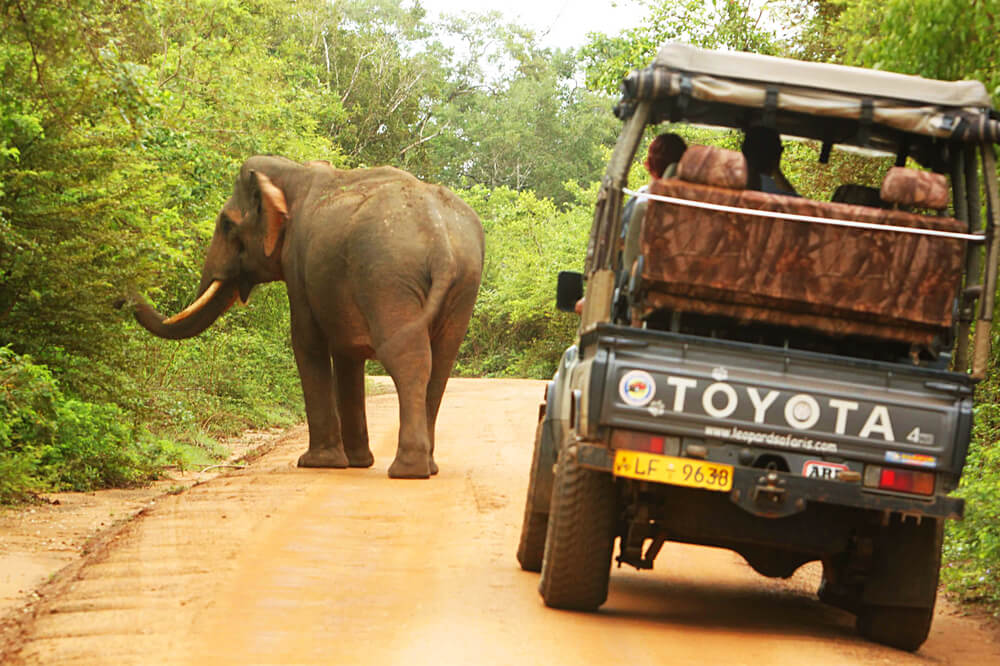
Ensuring your safety on safari begins before you even leave your house.
The deadliest animal you’ll encounter on safari is the pesky little mosquito.
Be sure to consult a travel doctor for the required vaccinations, stock up on malaria prophylactics and don’t forget to pack a strong mosquito repellent.
You’ll need a yellow fever vaccination for travel to many countries in Africa and will be required to present an International Certificate of Vaccination.
Check this comprehensive list to find out the yellow fever vaccination requirements for your destinations.
See our Wayfairer Travel Guides more information on medical requirements for our African destinations.
Many safari travellers make the mistake of over-packing, so we’ve listed all the essentials to bring, including what to wear, and what to leave at home.
Pack comfortable clothes made out of moisture-wicking materials to help combat the heat.
Wear a hat and light, long layers to protect you from prickly plants, stinging insects and reptiles.
Bring a bandanna or scarf that you can wet and wrap around your neck for extra relief in the hot weather. Depending on the season, you’ll also need to pack some warm layers.
It’s imperative to choose comfortable, sturdy shoes such as boots or hard rubber soles. Wear your shoes for at least a month before going on safari so you know they won’t plague you with blisters.
The colour of your clothes can play a big part in the number of animals you spot on safari. The worst colours to wear are white, black and bright colours, as these stand out to most animals and will cause them to flee. Try to blend in with the landscape by wearing dark green, brown and khaki colours. You don’t need to deck yourself out in a cliche safari outfit - simple, comfortable clothing in neutral colours is best.
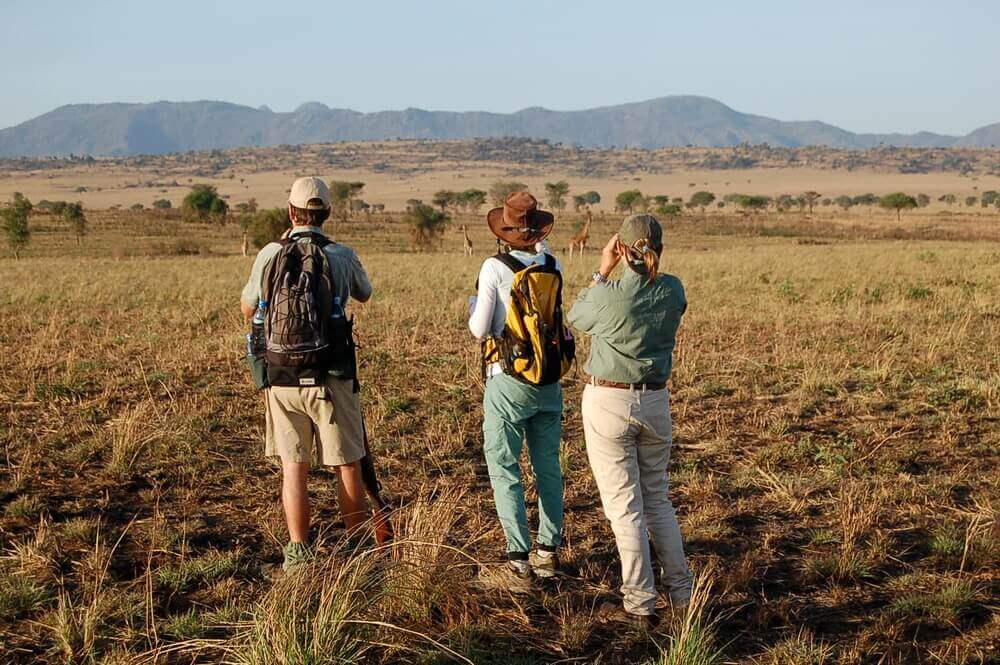
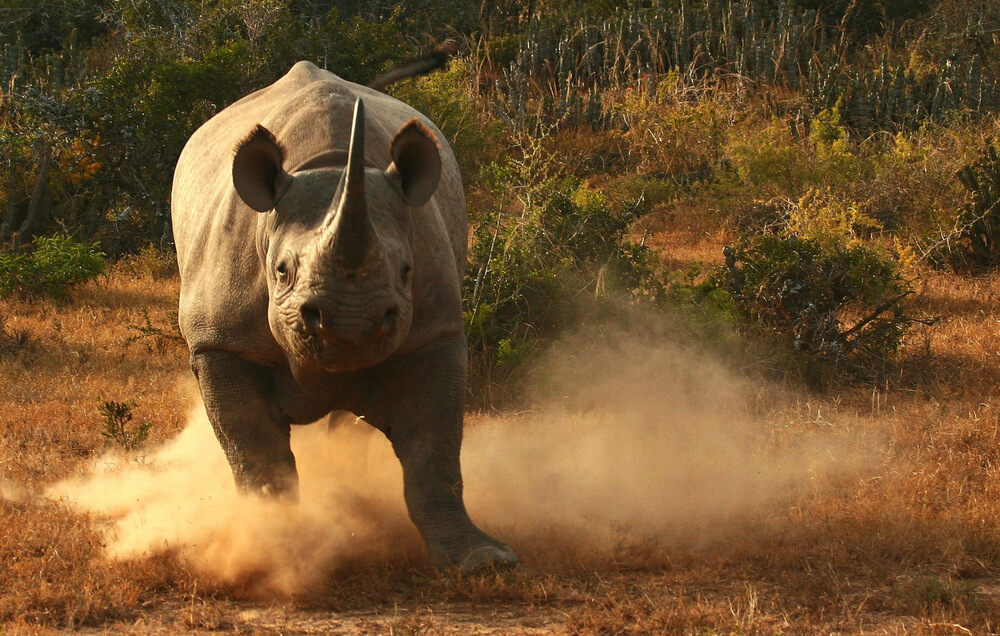
An African safari can be experienced in many wonderful ways including open jeep, self drive and even walking safaris. We’ve rounded up our top tips for safari safety and these general safari rules apply to all African wildlife encounters.
Paying attention to your guides is the most crucial thing to do on safari. The guides are experts in the environment and animal behaviour and they will have the best judgement in any situation. Their job is to keep you safe so it’s imperative that you always follow their instructions.
The guides do carry loaded guns to use as a last resort in a dangerous situation. They are rarely used and are mostly for the protection of the trackers who may head off into the bush in search of animals. You don’t need to bring any weapons on your safari.
The plains of Africa are not a zoo and the animals must not be disturbed as they roam about in their natural habitat. Never call out or wave to an animal as this will spook them. They will either run away and ruin the sighting experience for everyone, or they’ll charge at you, putting everyone’s life in serious danger. Don’t get too close to animals, as they are unpredictable and can move very quickly when threatened. It goes without saying that you should never try to touch or feed an animal.
It’s important not to make too much noise as animals scare easily. The animals are used to the sounds of the vehicles but human noise will upset them. Mute your devices to avoid any loud beeping and if you need to talk, do so in a whisper. It’s easy to embrace an awed silence when you’re immersed in a thrilling search for wildlife. Sit back and let the beauty of the African bush take your breath away.
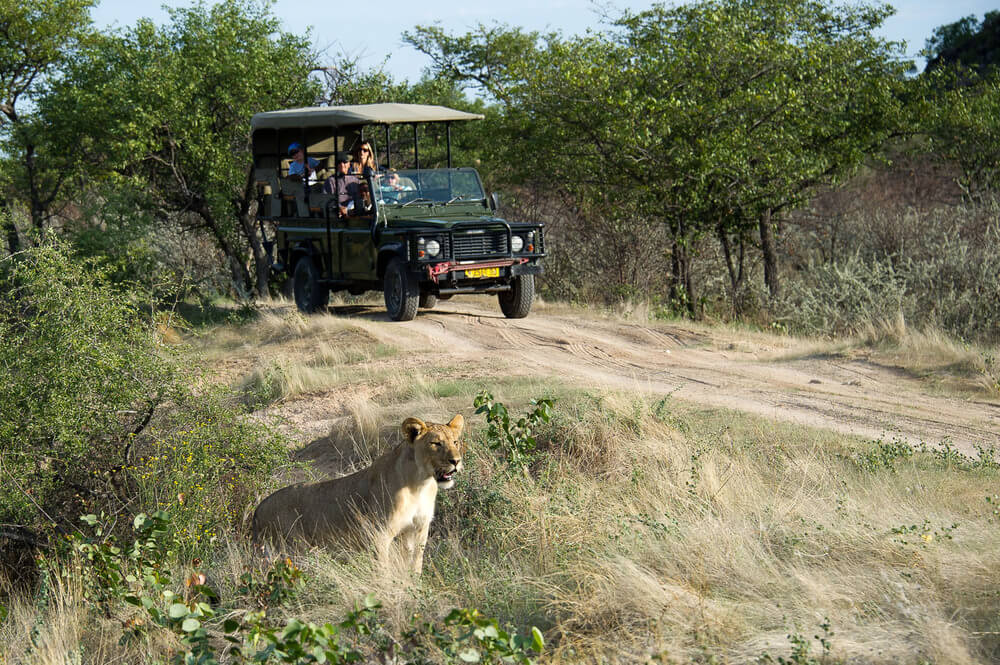
Don’t bring any food or drink except water. Animals have an incredible sense of smell and will be attracted by something as small as a wrapped candy. Sodas and sweet drinks always lure stinging insects so stick to water. If you do need to eat while on safari (possibly for medical reasons), try to avoid anything with noisy packaging and inform your guide before heading off.
Depending on your safari, there may be safe times to take a toilet break or there may be no stops at all. Your guide will explain the rules for toilet stops before you leave and if you need to make an emergency stop just let your guide know. Be prepared to go behind a bush and check the ground for creepy-crawlies before you go.
These are two big no-no’s. Smoking is a fire hazard in the African bush and will pollute the natural environment and disturb the animals. Littering is also never okay. Leave no trace and dispose of all trash in designated bins.
Always wear a hat and sunscreen, reapplying throughout the day. Stay hydrated with filtered or packaged water as dehydration can quickly become a serious problem in the African bush. You don’t want your safari to be marred by a trip to the hospital due to heat exhaustion.
Depending on the season, you may experience some heavy downpours. Most open-jeep safaris will keep ponchos in the vehicle in case of a shower. Walking safaris are not recommended during the wet season as the trails become muddy and dangerous. Bring a waterproof bag to protect your camera from the rain.
The only device you should need is your camera and it’s important that you always check with your guide before taking photographs. Animals may run away when they hear the click of the camera, spoiling the sighting for everyone. The camera flash must always be turned off to avoid aggravating the wildlife.
Don’t bring your phone on a safari. You likely won’t have a connection anyway and it’s highly irritating when a traveller is chatting and texting on their phone while others are trying to enjoy the tranquility of the African outback. If you absolutely must bring your phone, ensure it is completely muted.
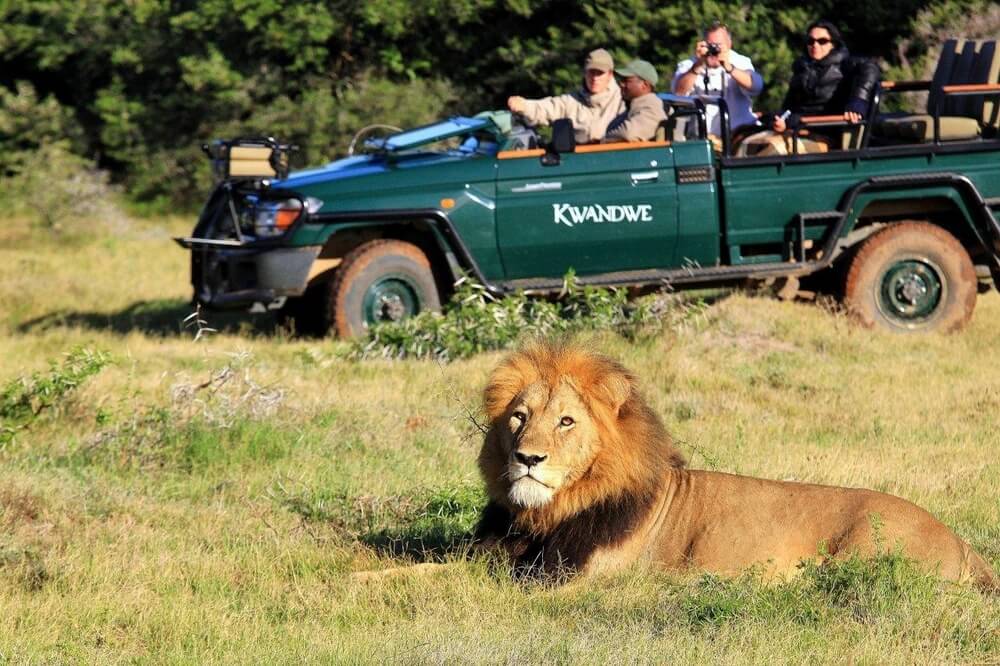
The most popular way to see the wildlife of Africa is with a vehicle safari, including open-jeep and self-drive safaris. Follow these safari safety tips to stay out of danger and to boost your chances of spotting some incredible wildlife.
Never stand up or dangle your arms or legs out of the vehicle. Never leave the vehicle. Doing so will provoke the animals, putting everyone at serious risk.
African parks and reserves are full of prickly bushes and wayward tree branches which can hang in the path of the vehicles. This is another good reason to keep your arms and legs inside the vehicle.
It is common for animals to come quite close to the vehicles without taking any interest in them. Why? Victoria Erskine, a Wayfairer Africa Travel Specialist, says the animals are used to the sight and smell of the vehicles. “They see the jeep as a single item and don’t smell the people in it as a separate item. That’s why it’s important for travellers to stay within the vehicle, because if they move their bodies outside the shape of the jeep, the animals may recognise something new about them and decide to investigate.” Victoria says this is particularly pertinent when watching a kill, as the lions are in hunting mode. You don’t want to become their new target!
Self-drive safaris are one of the most intimate ways to encounter the wildlife of Africa however they are recommended for experienced drivers and safari veterans. They come with their own set of challenges and you can learn more about staying safe on a self-drive safari with Kruger National Park’s self-drive safari guide.
Some of the most crucial points to remember are keep your windows up, drive slowly and carefully, and stay on the marked paths. Never leave your vehicle even if there are no animals around, as there may be snakes or other creatures hiding in the grass.
If you are taking a self-drive safari, be sure to enquire about emergency protocol and rescue procedures at the game reserve before heading off. If you break down, remain in your vehicle at all times. Call the emergency number or wait for a passing vehicle if you have no phone. Always inform the reserve of your plans before leaving and always stay on the marked paths to avoid danger and to be easily spotted by rescue teams.
If you are on a guided game drive, your guides will be well-trained in vehicle breakdown procedures. Stay calm and let your guides handle the situation. Victoria Erskine, a Wayfairer Africa Travel Specialist, has experienced a vehicle breakdown on safari. “The jeep broke down with a pride of lions quite close by - adrenaline extreme!” While it was a heart stopping experience, Victoria says the guides expertly managed the situation and they all returned to camp safely.
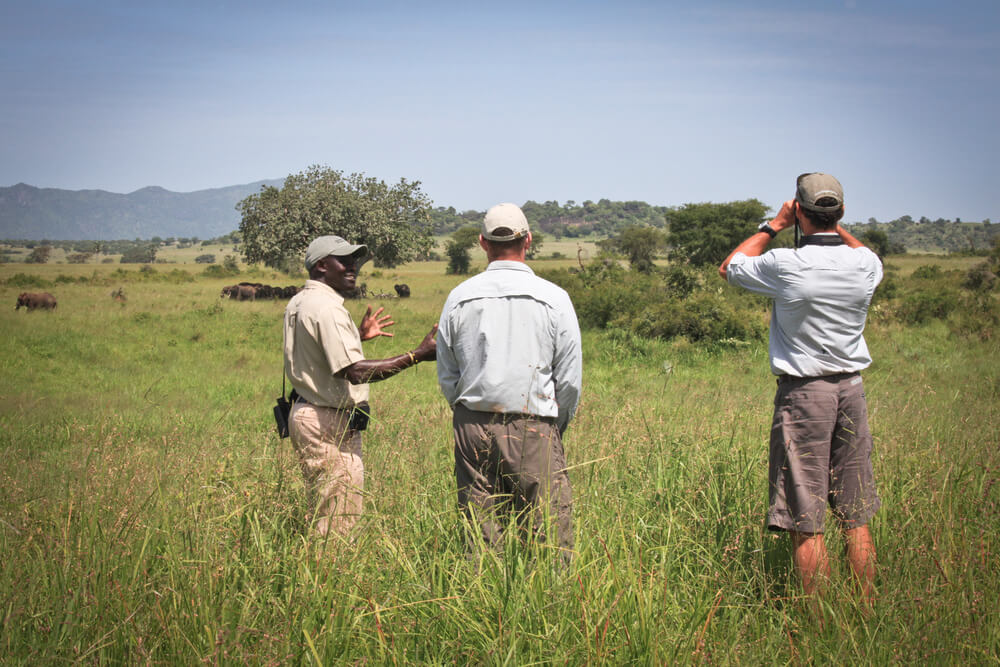
A walking safari is an exhilarating experience, allowing you to move at a slower pace and truly immerse in your natural surroundings. Choosing a reputable tour is crucial and we can advise you on the best walking safaris in Africa. One of our favourites is in Laikipia where you can choose to trek for a day or go on longer multi-day hikes through this unspoiled corner of Kenya. Zambia is also another great walking safari destination, as the activity was invented here.
As with all safaris and wildlife experiences, walking safaris come with risks. The expert guides go through rigorous training and their chief priority is your safety. You can heavily reduce your risk of danger simply by listening to your guides instructions at all times. However, animals are unpredictable and things can go wrong, so here are a few extra safari safety tips to follow.
It’s important to stay downwind so the animal doesn’t catch your scent. Your guide will instruct you on the best route to walk to ensure you stay downwind.
If you are approached by a hostile animal, give it a wide berth and check you aren’t blocking its escape route. Move away slowly, but never turn your back on an animal and never run away, as these movements will aggravate the animal. If you do come close to an agitated animal, always listen to your guide for the safest course of action.
The best way for your walking safari to move about is in a single file about an arm’s length from each other. This way, animals will see you as one unit rather than a herd that can be split up. It also means that the armed guides up front will have walked the track before you, protecting you from any danger lurking along the path.
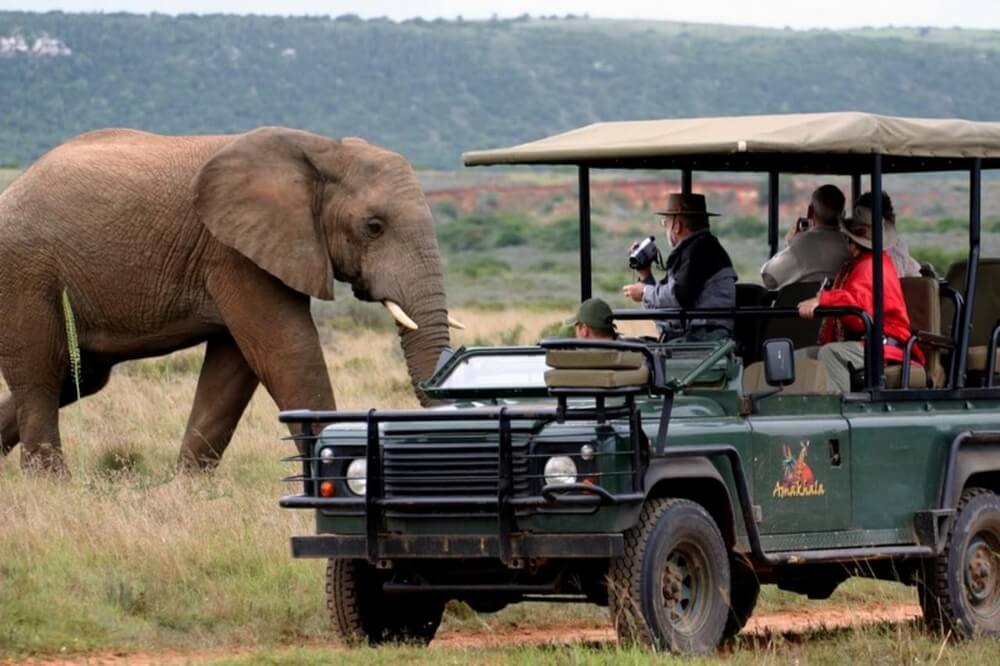
Whether it’s your first or tenth time on an African safari, there is a general safari etiquette to follow. It’s important to be respectful of your guides and fellow travellers so everyone can have an unforgettable safari experience. Brush up on these safari rules and etiquette tips before venturing into the bush.
Your safari guides want you to see the best wildlife but there’s no guarantee you’ll spot everything. Animals are unpredictable and often like to remain hidden as they roam freely around the massive reserves. For many people, African safaris are a once-in-a-lifetime experience and they travel a long way with high expectations. It’s unlikely that you’ll spot the Big Five on your first game drive, so try not to be disappointed and don’t get frustrated with your guide if it’s not possible to find every animal you want to see.
It’s good manners to allow everyone a chance to spot the majestic creatures of the African plains. There’s an unwritten rule that everyone gets a 10-15 minute window to view the animals, then move on to let the cars behind you have a turn. It’s also polite to swap seats with people each day. If you had the best seats yesterday, let someone sit there the next day. Also, don’t go overboard when boasting about your wildlife sightings back at camp, in case other travellers weren’t so lucky!
Most will have people with a range of interests. Some want to spot the Big Five while others may be focused on birdwatching. Respect your fellow travellers wishes to stay and observe certain animals, even if you are not interested.
If you are on a tight schedule and don’t want to be restricted by other travellers, consider doing a private game drive or a self-drive safari. That way, you’ll have full control over how you spend your time in the reserves.
It’s good practice to tip your guide and the safari lodge staff.
If you’re not sure how much to tip, don’t ask them directly. Instead, ask the camp manager as they usually don’t receive tips. An acceptable amount is usually $10 per person per day for your guide and lodge staff.
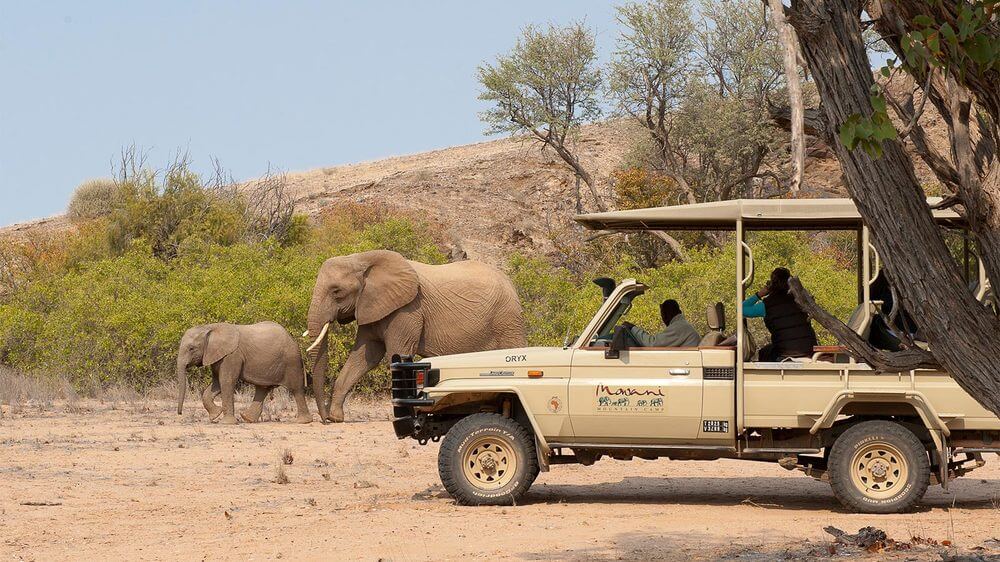
One of the best parts of going on safari in Africa is your stay in a lodge or camp. At Wayfairer, we work with a number of reputable and luxury safari lodges and camps, offering first class security and all the amenities of a five-star hotel.
All prominent lodges and camps have excellent safety procedures and you'll be advised of these once you arrive at the property.
The camps are well guarded at all times and some camps also provide escorts for moving about the property.
Animals can roam quite close to the camps, so it’s important to remain vigilant. The following tips will help you prepare for some spectacular nights in the African bush.
Plenty of wildlife comes alive at night and it’s not safe to walk around in the dark. If you’d like to spot some nocturnal creatures, many lodges offer guided night game drives.
Animals can smell your food from miles away and keeping food or sweet drinks in your tent is a sure way to attract hyenas, baboons and insects. If you are camping, ensure your tent remains zipped up at all times.
Although it may be tempting to take a refreshing dip in the water, the rivers and lakes are often filled with crocodiles and hippos, one of the most dangerous animals in Africa.
Always wear boots, socks and long pants when walking around the bush and lodgings. There are lots of thorny plants and plenty of insects, snakes and scorpions that can bite you.
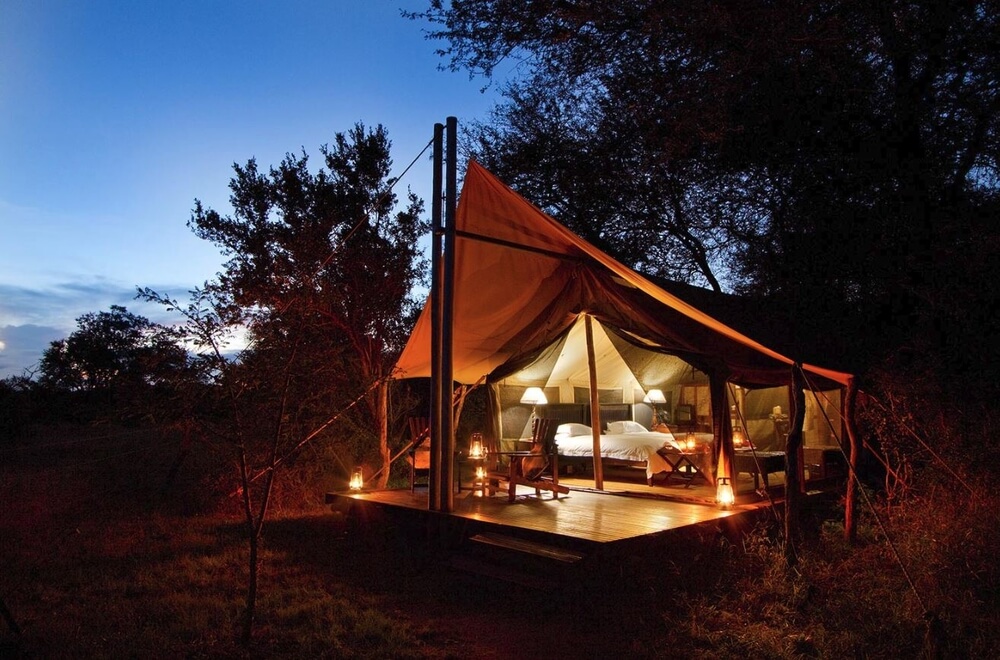
Africa is a continent full of fascinating cultures and traditions and it’s important to treat everyone with respect during your visit.
We recommend reading up on the culture of the destinations you are visiting to help build a friendly rapport with the locals and avoid any offensive behaviour. Always greet people politely and don’t take photographs without permission.
Don’t bring sweets for children and don’t give money or gifts to people you don’t know.
If you’d like to contribute to the community, a cash donation to the right organisation is often the best way.
Wayfairer partners with many lodges across Africa who run fantastic social and environmental conservation projects. Speak to our Africa Team to find out how you can get involved during your safari.
An African safari can be a deeply enriching experience for children and one of the best trips you’ll ever take as a family. Many safari lodges and camps offer family-friendly safaris, with spacious family accommodation and child-friendly activities. Take a read of our African Safari with Kids blog for a mum's perspective on the best safari destinations for children.
Most camps have age restrictions and these usually range from eight to twelve years old (although some camps don’t accept children at all).
This is for safety reasons, although game drives can be long and boring for young kids and they may disturb other travellers as they struggle to sit quietly. At an older age, children are usually able to sit quietly and will likely have a more memorable experience.
If you want to go on safari with younger children, a self-drive safari is best as you’ll have complete control over your daily schedule. We can help you customise the perfect African safari to suit your family.
When travelling to any country it’s important to check for any political or civil unrest. Countries such as Northern Kenya, Western Tanzania, Uganda and Rwanda have had recent incidents, however there is currently no need to avoid any of the iconic African safari destinations.
You can get the most up-to-date information from government travel advisories including the US, UK and Australian websites. Staying aware of current events will ensure you have the safest safari experience possible. If you’re concerned about any African safari destinations, our Africa Travel Specialists will be happy to advise you.
If you'd like to book a safari to Africa, don’t hesitate to contact our friendly team of Africa Travel Specialists to chat about your ideas and get all your questions answered.
ปรึกษาทีมงาน
ศึกษาข้อมูลเพิ่มเติมและวางแผนทริปสุดพิเศษของท่านด้วยความช่วยเหลือจาก
ผู้เชี่ยวชาญ โทร 0117 313 3300